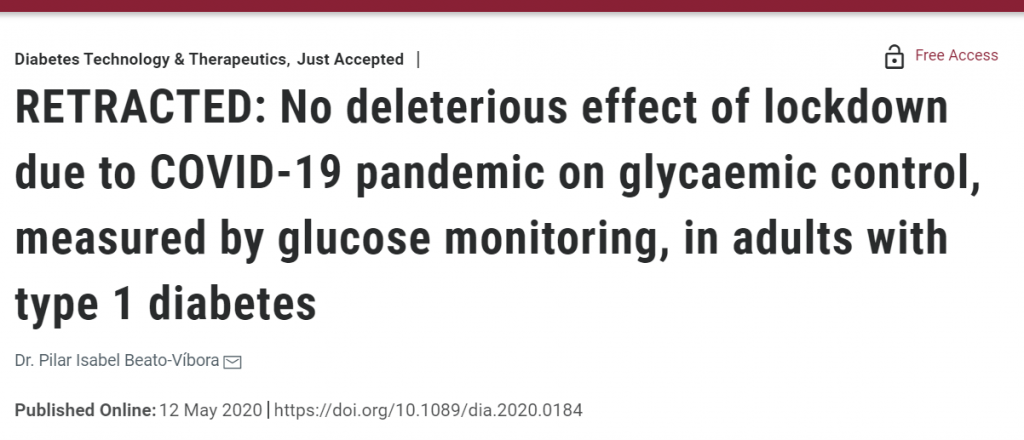
An allegation of plagiarism in a paper about Covid-19 in people with diabetes led to a retraction, but not for lifted text.
Earlier this year, the journal Diabetes Technology & Therapeutics, a Mary Ann Liebert title, published “No deleterious effect of lockdown due to COVID-19 pandemic on glycaemic control, measured by glucose monitoring, in adults with type 1 diabetes.” The author was Pilar Isabel Beato-Vi[accent over i]bora, of University Hospital Complex Badajoz, in Spain.
According to the article, the lockdown of Spain in response to the pandemic did not seem to make it harder for people with type 1 diabetes there to control their blood sugar.
The finding made at least one headline, in Medscape, which covered the paper when it appeared online in May.
But it also sounded alarms with at least one reader. As the retraction notice explains:
The Editor of Diabetes Technology & Therapeutics is officially retracting the article entitled, “No Deleterious Effect of Lockdown Due to COVID-19 Pandemic on Glycaemic Control, Measured by Glucose Monitoring, in Adults with Type 1 Diabetes,” by Beato-Vibora PI. Diabetes Technol Ther 2020; epub DOI: 10.1089/dia.2020.0184. After the Instant Online publication of the article, the journal editor received correspondence indicating that some portions of the paper may have been plagiarized. An internal investigation was launched into the accusation, and though the charge of plagiarism was not found to be compelling, it was discovered that the author’s Institutional Review Board approval statements for the paper were secured after submission and publication of the article, and only after the publisher requested said documentation. The author explained that IRB approval was not secured due to her institution’s closure because of the COVID-19 pandemic. Despite these unusual circumstances, it is a clear violation of proper and standard protocols for studies containing human subjects, and therefore the Journal officially retracts the paper. Diabetes Technology & Therapeutics, its editors, and its publisher are committed to upholding the strictest standards of the scientific record and the community it serves and will not tolerate any improprieties or violations of proper scientific publishing conventions.
We emailed the Beato-Vibora for comment but did not hear back.
Susan Jensen, the director of editorial services and peer review for Liebert, told us:
We were originally contacted by an editor (Victoria Glasson) of Diabetes Therapy, published by Springer. In her email to us, she said, “I have been contacted by a member of the journals advisory board who has recently published a paper with the journal (https://link.springer.com/article/10.1007/s13300-020-00829-7)….Dr. Gian Paolo Fadini (from the University of Padova in Padova, Italy) has noted that a paper recently published by Diabetes Technology & Therapeutics by Dr. Beato-Víbora is very similar to his published paper.”
Upon receipt of the complaint, we ran a plagiarism report and sent it to our ethics editor for review. He found that there was “nothing compelling” with regard to the allegation of plagiarism … However, it was during his review of that complaint that he raised the issue of whether IRB approval had been secured. It was at that time that we asked the author to submit the requisite IRB paperwork. Unfortunately, it was our request to produce the documents that triggered the author to seek the approvals. In response, the author did send our ethics editor the IRB approval documents that were officially signed and dated the same day we asked for the documentation. When questioned about the dates, the author said she could not secure them prior to the commencement of her work due to the COVID-19 pandemic. Though we understand the many difficulties and ripple effects that the pandemic has presented to the entire world, we must remain committed to the proper standards of peer review.
Jensen said the notice didn’t include the specifics of Fadini’s allegations:
since our ethics editor found no justification in the claim.
We note that our plagiarism check did not reveal any overlap, either.
The paper joins our list of more than 30 retracted COVID-19 papers.
Update, 0000 UTC, 8/14/20: Beato-Vibora told us that she disagreed with the retraction:
Regarding the accusation of plagiarism, it was absolutely unsupported, as the DTT editors recognized, mainly because my paper was submitted for publication the 26th of April and the Italian paper was published online the 11st of May. I still don’t understand the intentions of these accusations.
As to the question of IRB approval, she said:
the national state of emergency in Spain due to the covid pandemic made the paperwork complicated but I did secure the IRB approval and, in the end, I was able to provide the written amended IRB approval, dated before the data collection and the paper submission. I profoundly respect the Diabetes Technology & Therapeutics Journal and understand that they must follow their protocols, but the retraction of my paper still seems not justified to me, especially in these unprecedented circumstances in the world, in an observational study with no intervention and following routine clinical practice. Some very similar papers have been published in the last weeks where the authors only explain, in the Ethics paragraph, that they were following routine clinical practice to get the cgm data.
Like Retraction Watch? You can make a tax-deductible contribution to support our work, follow us on Twitter, like us on Facebook, add us to your RSS reader, or subscribe to our daily digest. If you find a retraction that’s not in our database, you can let us know here. For comments or feedback, email us at [email protected].